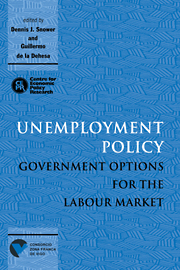Book contents
- Frontmatter
- Contents
- List of figures
- List of tables
- Preface
- Acknowledgements
- List of conference participants
- 1 Introduction
- PART ONE GENERAL POLICY ISSUES
- 2 Evaluating unemployment policies: what do the underlying theories tell us?
- 3 High unemployment from a political economy perspective
- Discussion
- Discussion
- PART TWO DEMAND MANAGEMENT AND SUPPLY-SIDE POLICY
- PART THREE SUBSIDISING EMPLOYMENT AND TRAINING
- PART FOUR LABOUR MARKET REGULATIONS
- PART FIVE POLICY, JOB REALLOCATION AND THE UNEMPLOYMENT–PRODUCTIVITY RELATION
- PART SIX COMPARING UNEMPLOYMENT POLICIES
- Index
Discussion
Published online by Cambridge University Press: 07 September 2010
- Frontmatter
- Contents
- List of figures
- List of tables
- Preface
- Acknowledgements
- List of conference participants
- 1 Introduction
- PART ONE GENERAL POLICY ISSUES
- 2 Evaluating unemployment policies: what do the underlying theories tell us?
- 3 High unemployment from a political economy perspective
- Discussion
- Discussion
- PART TWO DEMAND MANAGEMENT AND SUPPLY-SIDE POLICY
- PART THREE SUBSIDISING EMPLOYMENT AND TRAINING
- PART FOUR LABOUR MARKET REGULATIONS
- PART FIVE POLICY, JOB REALLOCATION AND THE UNEMPLOYMENT–PRODUCTIVITY RELATION
- PART SIX COMPARING UNEMPLOYMENT POLICIES
- Index
Summary
Gilles Saint-Paul's chapter 3 presents an important and interesting perspective on unemployment policy. It addresses the problem of why it should be that governments often appear to take policy actions which seem likely to make matters worse and are sometimes reluctant to adopt policies which might be expected to reduce unemployment. The argument is that governments adopt policies not on the basis of overall social benefit (or economic efficiency) but in response to pressure from politically powerful groups.
While, in very general terms, this is not a new idea, there are a number of less familiar implications developed in the chapter. One of the most interesting is an application of the time-consistency problem. The idea is that governments cannot commit themselves to addressing policy objectives through the tax system, since whatever they may promise ex ante they have an incentive ex post to adjust tax rates in response to immediate electoral or other advantage. Hence governments prefer laws and regulations, which cannot as easily be revoked, as methods of delivering policy objectives. Minimum wages may have greater efficiency costs than the tax system as a means of assisting the low paid but, because they become entrenched in the economic structure in a way the particular tax parameters cannot be, they provide a continuing means of support which redistributive taxation does not.
In this comment I wish to ask, however, whether this approach can explain observations other than those which led to its formulation.
- Type
- Chapter
- Information
- Unemployment PolicyGovernment Options for the Labour Market, pp. 77 - 80Publisher: Cambridge University PressPrint publication year: 1997



